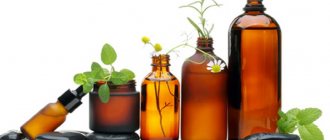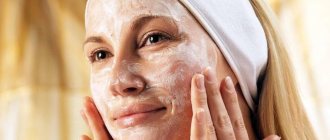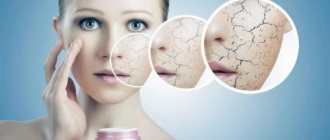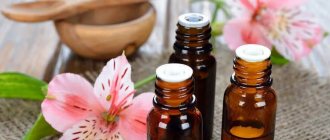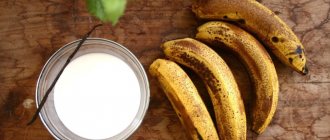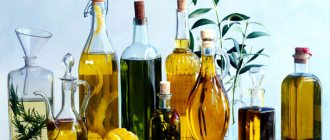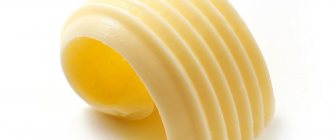Sebum is a natural moisturizer for our skin, creating a protective mantle on the surface of the epidermis that prevents moisture loss.
For the most part, fatty lubricant consists of lipids - fatty acids, wax esters and cholesterol, but its chemical composition is individual and different for each person, which means the balance can also be different.
Low activity of the sebaceous glands, due to various reasons, can lead to a deficiency of sebum and, as a result, to increased dryness of the skin, and in some cases to irritation and peeling.
In this case, base oils for dry skin come to the rescue, which have recently become very popular, as they are an excellent alternative to traditional cosmetics due to their high moisturizing properties and the ability to regulate the secretion of fatty lubricants.
What is the difference between oils and face cream? Both promote hydration, but the cream is usually made by emulsifying oil and water, and to ensure they mix well, add an additional ingredient, such as wax, which is melted at elevated temperatures to reduce the activity of the antioxidant components. Plus – the presence of preservatives that do not benefit the epidermal layer.
Homemade Makeup Removers
Unlike creams, oils contain a huge amount of essential natural compounds necessary for the epidermis and, along with their low cost, are effective in facial care procedures.
Below are several proven oils that are excellent for dehydrated epidermis and have a high level of compatibility with human skin.
Jojoba
Perhaps the best oil for dry skin, which actually consists of fats and wax esters, the composition of which is as close as possible to natural sebum, which makes it a powerful natural moisturizer. The product has a rich composition and has the ability to regulate the functioning of the sebaceous glands.
When applied, it creates a protective film that prevents moisture loss. It is recommended to use as a base before applying makeup or at night, and also as an additional component to creams, lotions, and masks. You can read about the properties of the product and how to use it in this article.
Why do you need facial oils?
Oils of plant origin can stimulate metabolic processes in skin cells, for example, the synthesis of hyaluronic acid. This creates the necessary conditions for restoring the epidermis and improving the color and condition of the skin.
An additional benefit when using oils is aromatherapy
Properly selected essential oils will help achieve the following results :
- hydration;
- improvement of microcirculation;
- activation of the sebaceous glands;
- skin renewal at the cellular level;
- regeneration.
Useful combinations can be made from suitable oils . Coconut, olive, almond, jojoba and other products are suitable for dry skin. The use of oils that have astringent, disinfectant and hair-constricting effects is not recommended. Grapefruit, basil, cypress, laurel, lemon and bergamot are prohibited.
Rose hips
The product is rich in essential fatty acids and contains valuable vitamins such as E, C, D and beta-carotene. This composition allows you to effectively protect the epidermis from moisture loss, provide maximum hydration, reduce signs of aging and restore the elasticity of the skin.
The oil is easily absorbed and can be used in combination with other oil bases or serums as an intense moisturizer.
What recommendations must be followed?
The following steps will help you resolve the issue::
- Drink as much fluid as possible;
- For washing, use something that is not too hot, preferably free from bleach;
- Choose cleansers that contain less aggressive cleansers;
- Eat more foods rich in vitamins. You can additionally use vitamin complexes;
- During the heating season, additionally humidify the air in the apartment;
- Use moisturizing creams, masks, lotions.
Marula
Valuable marula oil, obtained from the fruits of an African tree, is an indispensable skin care product due to its versatility and a huge number of biologically active compounds.
The product is rich in fatty acids and contains 60% more antioxidants than most other oil base oils. Used as a strong moisturizer and anti-aging agent. Excellently fights peeling and irritation, nourishes and reduces wrinkles.
Useful tips
- When using ethers for aromatherapy, keep a diary for yourself where you will describe your sensations and reactions to odors;
- When adding essential oils to a bath, it should first be diluted with soap.
- Always pay attention to the dosage and do not exceed it. Remember that pregnant women, the elderly and children should take significantly lower doses than standard.
All cosmetic and essential vegetable fats can be safely called “liquid gold” , since the amount of useful substances brings great wealth to the body. They are useful not only as beauty products, but as food additives. And with the right combination, you will achieve incomparable results in beauty and health.
5 / 5 ( 15 votes)
LiveJournal
Shea butter
Super moisturizing and very gentle, shea or shea butter is perfect for both dry and sensitive skin. The creamy texture and rich composition of the product make it an indispensable product for deep hydration and nutrition of the epidermis.
Thanks to its solid consistency, shea butter is ideal for preparing homemade creams with the addition of almost any ingredients (aloe, honey, oil bases, essential oils, herbs, etc.). Before applying, shea butter should be held between your fingers a little so that it becomes softer based on body temperature.
Cosmetic oils for dry skin. Table “Basic cosmetic oils and their properties”
The tables describe the most popular base vegetable oils, their cosmetic and medicinal properties. As well as their ability to conduct essential oils and recommendations for combining base oils with other vegetable oils.
The abbreviations used in the text of the table are EO – essential oils, UV – ultraviolet solar rays.
For dry, sensitive and aging skin
| Name | Cosmetic and medicinal properties | Peculiarities | EM conductivity |
| Avocado | softening, nourishing, moisturizing, well absorbed, for dry, flaky, aging skin, skin around the eyes | has properties similar to human sebum, protects against ultraviolet rays | mix with apricot, peach, grape seed and as a transport oil for EO |
| Peanut | emollient, moisturizing, for dermatitis and other skin problems, for dry, sensitive skin and the skin around the eyes | increases lactation, dietary, low-calorie | independently and as a transport oil for EVs |
| Argan | moisturizing, nourishing, toning, regenerating, rejuvenating, anti-inflammatory, wound healing, for dry, mature, aging facial skin, sensitive eyelid skin, increases skin elasticity, firmness, smoothes wrinkles | the rarest and most expensive oil in the world | alone and with other transport oils and essential oils |
| Cherry pits | nourishing, moisturizing, softening, whitening, anti-sclerotic, anti-septic, antitumor, analgesic, wound healing, for dry, normal, sensitive, mature skin, smoothes, gives elasticity | natural filter for sun rays, prevents tanning | independently and with other transport EVs |
| Coconut | antibacterial, nourishing, moisturizing, softening | for dry, aging, sensitive skin, for skin infections and diseases, used in creams before and after tanning, cools and soothes inflamed skin | alone and in mixture with other fatty vegetable oils |
| Castor | emollient, nourishing, laxative, anti-inflammatory, for problems with dry skin and hair, enhances hair growth, can be used even for small children | lubricating the nipples increases lactation, to lubricate the navel in newborns | independently and as a transport vehicle for EM, has the highest penetrating ability |
| Macadamia | moisturizing, rejuvenating, anti-burn, softening, anti-inflammatory; for dry, aging, chapped skin; for hair care, eliminates dandruff | at temperatures below +10, a sediment appears, which does not affect the quality; when the temperature rises, the sediment disappears, ATTENTION: strong allergen | has high penetrating ability for EM |
| Olive | nourishing, softening, for skin diseases, antitumor, strengthens the immune system, for dry and aging, flaky facial skin, for dry hair | base for herbal oil infusions | does not transport essential oils well |
| Borage (borage) | nourishing, softening, immunostimulating, anti-ulcer, for dry, normal, aging skin, increases the protective properties of the skin, its elasticity | recommended for use after sunbathing | independently, in creams, masks |
| Palm red | antioxidant, renews cells, rejuvenates, nourishes and moisturizes dry, flaky, sensitive skin, protects nails from brittleness and splitting | close to animal fat, hardens at temperatures below 30, stores well | independently, in creams, masks |
| Soy | multivitamin, antipyretic, anti-inflammatory, anti-sclerotic, obesity prevention, anti-radiation, anti-ulcer, only for normal and dry skin | one of the most nutritious and fatty vegetable oils | independently and as a transport vehicle for EVs |
| Pistachio | softening, tonic, anti-inflammatory, nourishing, antioxidant, sun protection, whitening; in cosmetology: relieves inflammation, softens, tones dry, flaky and sensitive skin, smoothes wrinkles, strengthens nails and hair | removes freckles and age spots, protects skin from chapping, frostbite, sunburn | alone and as a transport oil for essential oils, mixed with vegetable oils, as an additive to creams, shampoo, ointments |
| Shea (karite) | moisturizing, restoring, protecting from sun rays, used in creams, ointments and gels for dry and normal skin of the face, hands, body; for lip and hair care | stored for 2 years; Before using with EM, melt at a temperature of up to 40 degrees. |
Argan
Another one of the few oils with strong moisturizing properties. The product, which is obtained from the fruit of the argan tree, is rich in unsaturated fatty acids (80%), contains high levels of vitamin E, squalene, carotenoids and ferulic acid.
Thanks to antioxidants, it protects the structure of the epidermis from damage caused by external factors, has an anti-inflammatory, soothing and healing effect, and provides deep hydration to the skin.
Apple peeling – cleansing and rejuvenating the skin
With regular use, fatty acids and squalene (a powerful moisturizing agent) maintain the structure of the hydrolipid barrier, replenish the deficiencies of the fatty components of the skin, providing the necessary balance of fatty lubrication, and regulate the functioning of the sebaceous glands.
Features of using oils for cosmetic purposes
Cosmetic and essential oils for moisturizing the skin are widely used when experiencing such sensations as dryness and tightness, providing good nutrition for the face and body, and are also rich in vitamins. Their use is often much more effective than cosmetic creams, since they are one hundred percent natural. A very good effect is observed when using cosmetic fats in combination with esters . To avoid causing severe irritation, it is better not to use them in concentrated form.
Olive
Olive oil has a natural ability to retain moisture and is very beneficial for dehydrated skin. The product contains various types of beneficial compounds, vitamins and antioxidants that provide nutrition.
Fatty acids and squalene regulate the secretion of fatty lubricants, protect the lipid layer from moisture loss and do an excellent job of flaking.
This product has a thick consistency, so it is not recommended for daily use. To achieve results, it is enough to use 2 times a week, or at least 3 times in case of extreme dryness.
For daily use, cosmetologists advise preparing a mixture of 10% olive and 90% almond oil.
How to mix and apply oils to the face: rules and tips
In order for oils to be beneficial and give the expected effect, they must be used correctly. To do this, you need to follow the following rules:
- the components should be mixed in glass or plastic containers, but under no circumstances in a metal container;
- for 5 ml of base (base oil) it is enough to use 1-2 drops of ether;
- if several types of essential oils are used at once in the preparation of an oil mixture, then they are added separately, and only with a 2-hour interval between the use of each of them;
- It is not recommended to use more than 5 varieties of essential oils at the same time;
- Before use, it is recommended to infuse the oil mixture for 4 days;
- The finished product must be stored in the refrigerator, the maximum shelf life is 2 months.
Applying oils to the face should take into account the following recommendations and rules:
- It is recommended to carry out skin treatment in the evening, since after it it is forbidden to go outside for at least 2 hours. Indeed, under the influence of ultraviolet radiation, some types of oils can become toxic and release carcinogens.
- Before using the product, the skin must be cleansed. For this purpose, a tonic, milk, gel or scrub is used.
- Oils are applied only to damp epidermis.
- Before use, the oil should be poured onto your palms and warmed slightly. Only then can you treat your face with it - this way it will quickly penetrate into the deep dermal layers.
- It is recommended to lubricate the skin along massage lines. Particular attention should be paid to problem areas where there are enlarged pores, rashes or other defects.
- To enhance the effect, you can cover your face with a napkin soaked in heated water.
Keep the mixture of oils on the skin for about 10 minutes. Then remove the remaining product using a cloth, which should be applied to the face and then removed. You cannot rub the epidermis, otherwise you can injure it.
Base oils can be used daily, esters - at least every other day.
Mango fruit
The advantage of mango oil for dry skin is its rich composition. Effective hydration of the epidermis is promoted by saturated and unsaturated acids, which are the building blocks of cell membranes, restore the hydrolipidic barrier of the epidermis and replenish hydration in the dermal layers.
Despite its solid consistency, the product melts quickly and is easily absorbed. When applied, it forms a thin film that protects against moisture loss and exposure to harmful ultraviolet radiation, eliminates itching and flaking. The skin after use becomes soft and silky.
Features of oily skin
Oily skin is not only a consequence of improper care, dietary errors or genetics. The condition of the epidermis is negatively affected by many external factors.
Problematic epidermis is characterized by a rather thick layer of skin with enlarged pores, acne or comedones. These defects do not necessarily appear immediately, but this skin type is more susceptible to them than others. There is an increased production of sebum. In the absence of proper care and complete cleansing, particles of sebum clog the pores and stretch them, which is why they become enlarged, and the face resembles a “sponge.”
However, oily skin also has some advantages. In particular, it is less susceptible to the negative effects of ultraviolet radiation and does not dry out under its influence. Therefore, inflammation and peeling of this type of epidermis are rare phenomena. Oily skin also ages much later than dry or normal skin, which can also be considered a great advantage.
Amaranta
The leader in the content of a strong moisturizing and anti-aging component is squalene. Its concentration in the product reaches 10%. Another powerful moisturizer is omega acids. Natural cosmetics are also a valuable source of natural antioxidants and vitamins.
All of the listed oils for dry skin are indispensable in home therapy and should be included in daily care, as they allow you to get rid of the problem in a short time.
Effective recipes for masks and oil mixtures: top 3 best remedies
It is best to use oils to care for oily skin in the form of masks or combined mixtures. You can prepare them according to the following recipes:
:
- Mix 1 tbsp. l. any cosmetic clay with 1 tsp. filtered or boiled water. Pour in half a teaspoon of calendula alcohol extract or fresh lemon juice. Add 3 drops of lavender essential oil, stir and apply the mask to your face. Leave until the clay dries, then wash with plenty of running water.
- Any type of base oil in an amount of 15 ml is mixed with 2 drops of lemon ether, 1 drop of eucalyptus, neroli and mint ester. Stir everything thoroughly, preparing a mixture of oils according to the principle described earlier. Using a cosmetic brush, spread the mask over the surface of the face, paying special attention to the most problematic areas. Leave for a maximum of 15 minutes, then remove the remaining mixture if necessary.
- Mix 10 ml of base oils – hazelnut, grape seed and jojoba – into 1 container. This mixture is prepared without adding esters. It copes well with increased oily skin and enlarged pores, acne and inflammation on the face.
It is recommended to choose the optimal recipe and use it on an ongoing basis.
Oils in cleansers
Oils not only moisturize, but also help remove makeup from the face - as part of certain formulas. “They are usually recommended because oil-based foundations are better at removing makeup and dirt or oily residue,” confirms Aura Serras, director of iS Clinical Spain. Oil should be a key ingredient in a cleansing formula—they don't do much in a regular cleanser.
These products can be used on both dry and wet skin. Apply a small amount of cleansing oil and massage over entire face. You can remove the product with a dry cloth or warm water.
Possible side effects
If you use oils without neglecting contraindications, no side effects should occur. But in the process of applying mixtures and mixing components, it is necessary to avoid contact of oil particles with the mucous membranes of the eyes and the respiratory tract. Otherwise, the following may develop:
- respiratory rhythm disturbances;
- tachycardia;
- a sharp deterioration in general health;
- redness and inflammation of the conjunctiva;
- bronchospasm;
- rashes and swelling on the skin.
Other adverse reactions are also possible - it all depends on the individual characteristics of the body. Often, the symptoms described above appear when you are allergic not to base oils, but to essential oils. An overdose or their use in pure form can cause a burn.
The ban on the use of oils for those with oily skin types is just a myth. The right choice of product will reduce the production of subcutaneous fat, improve the general condition of the epidermis, dry it and remove rashes.
Essential oils for oily skin care
Almost every person in his life has encountered excessive oily skin. The cause of oily skin is sebum and its excess. This skin condition occurs in both men and women; it is caused by overworking of the sebaceous glands. As a result, the glands begin to produce more sebum, especially during puberty. Oily skin looks untidy, oily and shiny. As a result of this, the pores expand, become clogged with dirt, dust and remnants of dead skin flakes, after which comedones are formed and inflammatory processes appear on the skin. Oily skin needs to be treated correctly; if the treatment is not correct, the functioning of the sebaceous glands changes. Pores quickly begin to clog, the protective properties of the skin weaken and immunity decreases. Essential oils will help us prevent and eliminate problems with oily skin. Contrary to popular belief, many essential oils actually regulate sebum production on the skin and have also been successful in treating acne. Essential oils are potent, so you only need a few drops, the dosage is almost always listed on the essential oil packaging. Essential oils soothe, tighten the skin, tighten pores and reduce inflammation, and also treat acne and normalize oily skin.
Using essential oils for skin
Essential oils should be used only with carrier oils that are suitable specifically for oily skin types, such oils include:
- grape seed oil;
- Coconut oil;
- almond oil;
- apricot kernel oil;
- hazelnut oil;
- jojoba oil;
- Sesame oil;
- laurel oil
Basic oils also have a positive effect on the skin, prevent irritation, tighten pores, nourish and moisturize well, and also treat acne and acne. If you use transport oils correctly and regularly, this will help prevent rashes, redness, oily shine and flaking, and your pores will be noticeably cleaned. As a result of this, the skin will acquire a matte and healthy appearance, and the skin texture will become even.
How to prepare the oil mixture
The oil mixture is prepared by mixing 2 - 3 drops of essential oil (the dosage can be increased if indicated in the instructions for the essential oil) with 5 - 10 milliliters of base oil. One or more essential oils are added to the base oil. You only need to mix essential oils that combine with each other, adding it to the base oil and infusing it for two hours to four days.
Essential oils that have a positive effect on oily skin
Essential oils of rosemary, tea tree, eucalyptus, lemongrass, thyme, clary sage, cypress, etc. have a positive effect on oily skin. All these essential oils have anti-inflammatory, antibacterial, wound-healing and antiseptic properties, which perfectly tighten pores, regulate sebum secretion, treat acne and give a healthy appearance to the skin. So, let's take a closer look at all the essential oils for the care and treatment of oily skin.
Rose essential oil
Rose essential oil is ideal for sensitive, dry or aging skin. But it also has a positive effect on oily skin; it not only has a tonic and astringent effect on the capillaries, but it is also effective for reticular veins and rosacea. According to scientists, it also contains therapeutic compounds that may promote the healing process, especially anti-inflammatory and antimicrobial substances. As a result, rose essential oil helps improve skin tone and texture, and is also effective for conditions such as dermatitis, psoriasis and acne. Rose essential oil regulates the functioning of the sebaceous glands, treats scars and dermatitis on the skin, and also has firming properties. Combined with rose essential oil are oils such as sandalwood, bergamot, clary sage, orange, palmarosa, geranium, patchouli, lavender, neroli and jasmine.
Rosemary essential oil
Another one of the best essential oils for oily skin and acne is rosemary essential oil. Rosemary essential oil is extracted from the fresh flowers of the medicinal rosemary. It has antiviral, antiseptic and antibacterial properties. Which have a beneficial effect on oily skin, rosemary essential oil is good for treating pimples and acne. In addition, it reduces excess oil on the skin and also gets rid of acne. The anti-inflammatory effect of rosemary essential oil reduces redness and swelling caused by acne. Tart rosemary essential oil is added to cleansing water, moisturizers and skin scrubs. Rosemary essential oil restores youth to the skin, improves blood circulation and skin tone. It is a universal oil for caring for problem skin. Thanks to the antiseptic and astringent properties of this oil, it will prevent sagging skin, acne, and also tones the skin. Rosemary essential oil will give you healthy and glowing skin. Combined with rosemary essential oil are oils such as lavender, cedar, thyme, frankincense, cinnamon, clary sage, grapefruit, eucalyptus, basil and mint.
Eucalyptus essential oil
This is one of my favorite essential oils for oily skin that I use frequently in my skincare routine. It contains strong antibacterial, antiseptic and regenerating properties that effectively get rid of bacteria, regulate the functioning of the sebaceous glands and reduce sebum production. Eucalyptus essential oil is mainly used to care for problematic and oily facial skin, as well as skin prone to acne and inflammation. Combined with eucalyptus essential oil are oils such as geranium, tea tree, mint, cedar, lavender, juniper, rosemary, lemon and thyme essential oils.
Aloe essential oil
Aloe vera essential oil has healing, anti-inflammatory, antimicrobial, moisturizing and soothing properties. Regular use of aloe essential oil reduces redness, inflammation and acne, and also has a cooling effect and prevents the formation of wrinkles. Aloe essential oil is rich in vitamins B, C and E, and also contains minerals such as allantoins, proteins, beta-carotene and amino acids.
Thyme essential oil
Thyme (thyme) essential oil – this oil is one of the best in treating oily skin and acne. Thanks to its antioxidant, antibacterial and anti-inflammatory properties, it can prevent manifestations such as eczema, pimples, blackheads, cuts, wounds and purulent inflammations. Also, thyme or thyme essential oil does an excellent job of fighting bacteria, cleansing the skin and improving blood circulation. Combined with thyme essential oil are oils such as rosemary, bergamot, lemon balm, cedar, tea tree, lemon, chamomile and juniper essential oils.
Clary sage essential oil
Clary sage essential oil is used for skin health; this oil has a particularly positive effect on oily skin. It fights well against signs of skin aging, reduces swelling and redness caused by acne. Also, clary sage essential oil regulates sebum production and treats purulent formations on the skin. The important linalyl acetate ester found in clary sage essential oil reduces skin inflammation and acts as a natural treatment for skin irritation and acne. Clary sage essential oil also inhibits the spread and growth of bacteria, reduces anxiety and stress, and helps normalize hormones. Combined with clary sage essential oil are essential oils of juniper, lavender, frankincense, grapefruit, cypress, bergamot and cedar.
Basil essential oil
Another one of the most effective essential oils for oily skin and acne is basil essential oil. It effectively treats scars and acne scars, and is also indispensable for other skin defects, such as papillomas, warts, burns and acne. In addition, when adding basil essential oil to homemade body lotion, it perfectly nourishes and moisturizes the skin, and also smooths out wrinkles and regulates sebum production. When adding basil essential oil to a lotion or cream, you must mix it with a carrier oil. Combined with basil essential oil are essential oils such as bergamot, clary sage, lavender, myrtle, lemon, eucalyptus, juniper, neroli and rosemary.
Chamomile essential oil
Chamomile essential oil has a positive effect on oily skin and is known to be a powerful essential oil that reduces pain and swelling. In addition, it has anti-inflammatory and antibacterial effects, which is very effective in treating acne. Its soothing properties present in the essential oil can relieve redness and irritation caused by acne. In addition, chamomile essential oil effectively treats pimples and acne, and also smoothes wrinkles and whitens the skin. You can add a few drops of essential oil to your homemade cleansing lotion and wash your face with it every morning and evening until you get positive results. Combined with chamomile essential oil are oils such as lavender, rose, tea tree, bergamot, geranium, jasmine, lemon, neroli, ylang-ylang and patchouli.
Cypress essential oil
Cypress essential oil is obtained by steam distillation from cypress branches and has astringent properties that deeply cleanse the skin. It also effectively tightens the facial contour and tightens pores. In addition, cypress essential oil can increase blood flow to the skin, and also tones and reduces sebum production. Combined with cypress essential oil are oils such as jasmine, clary sage, orange, bergamot, juniper, grapefruit and lemon.
Sea buckthorn essential oil
Sea buckthorn essential oil has protective antioxidant properties and is low in linoleic acid. Therefore, if you mix it with other oils with a higher content of linoleic acid, you can create a product with an anti-aging effect. In addition, sea buckthorn essential oil effectively eliminates scars, pimples, acne and uneven skin, and also smoothes out fine wrinkles and promotes rapid regeneration of the skin. Sea buckthorn essential oil is also suitable for caring for the skin around the eyes because it is completely hypoallergenic. Combined with sea buckthorn essential oil are essential oils such as bergamot, calendula, geranium, neroli, orange, carrot seeds, lavender and rosemary.
Schisandra essential oil
One of the best essential oils for oily, acne-prone and porous skin is lemongrass essential oil. It perfectly nourishes the skin, has cooling, antiseptic and anti-inflammatory properties. Schisandra essential oil perfectly cleanses pores, normalizes the function of the sebaceous glands and prevents inflammation.
Orange essential oil
Orange essential oil is one of the effective essential oils for oily skin and acne. The citric acid present in this essential oil has the ability to regulate the production of sebum and other impurities. In addition, orange essential oil increases blood circulation. It also works as an excellent antiseptic that prevents pimples and acne. Orange essential oil perfectly tightens pores, eliminates acne scars, reduces wrinkles and restores skin elasticity. Combined with orange essential oil are oils such as clary sage, lavender, cardamom, coriander, ylang-ylang, sandalwood, neroli, rosemary, cypress and juniper.
Bergamot essential oil
Bergamot essential oil is effective for oily skin and acne and is an excellent treatment for problematic skin. Its antibacterial properties help in getting rid of pimples and acne. In addition, bergamot essential oil perfectly regulates the functioning of the sebaceous glands and tightens pores. You can add this essential oil to any vegetable oil (almond, olive, etc.) and use it on the skin. Jojoba base oil 10 teaspoons, then add bergamot essential oil 10 - 12 drops, tea tree essential oil 5 drops and lavender essential oil 8 drops, then pour all the above ingredients into a clean glass jar or bottle and mix thoroughly. This oil mixture is used for oily skin and acne-prone skin, as well as in the form of massage oil, it is used every day, before bed. The prepared oil is excellent for getting rid of pimples and acne, as well as for preventing acne in the future. Combined with orange essential oil are oils such as essential oil of cypress, juniper, lavender, lemon balm, neroli, ylang-ylang, patchouli, coriander, eucalyptus and cedar.
Oregano essential oil
Oregano essential oil is also effective for oily skin and acne, it has antibacterial and antiseptic properties and also has excellent potential for eliminating unwanted pimples and blackheads from the surface of the skin. Oregano essential oil effectively treats skin diseases such as eczema, psoriasis, scabies, pimples and acne. This essential oil is diluted with carrier oils, such oils include jojoba oil, olive oil and coconut oil. It is necessary to apply diluted oils regularly to achieve healthy and clean skin. Oils that can be combined with oregano essential oil include essential oils of lavender, eucalyptus, pine, rosemary, cedar and bergamot.
Lemongrass essential oil
Lemongrass essential oil is obtained by steam distillation of lemongrass leaves and stems. It is rich in vitamin A, which helps increase skin cell regeneration. In addition, it also removes dead skin cells, making acne scars and spots less noticeable. This essential oil is one of the ideal essential oils for oily skin; it removes excess oil from the surface of the skin well. This oil has bactericidal, astringent and antimicrobial properties, which are excellent for treating acne. The astringent properties of lemongrass essential oil help reduce open skin pores, it tightens pores, whitens facial skin, and also gets rid of age spots. Lemongrass essential oil works as a natural astringent that does not dry out the skin and regulates the functioning of the sebaceous glands. It is used not only for the face, but also this oil is successfully used for steam baths and herbal saunas. If you use lemongrass essential oil regularly, it will remove and prevent acne and pimples.
Palmarosa essential oil
One of the essential oils for oily skin and acne is palmarosa essential oil. This essential oil helps keep skin hydrated, regulates sebum production and stimulates skin cell regeneration. Moreover, it is a natural antiseptic and also has antibacterial properties, which is very effective in removing bacteria that cause acne. Combined with palmarosa essential oil are oils such as ylang-ylang, lavender, sandalwood, myrrh, geranium, frankincense, jasmine and rose.
Juniper essential oil
Another effective essential oil for oily skin and acne is juniper essential oil. It has antibacterial and antimicrobial properties, making it a popular natural remedy for combating skin irritations and infections. Juniper essential oil also works well as a home acne treatment to get beautiful and flawless skin. In addition, it removes toxins well, restores the skin and protects the skin and body from harmful toxins that lead to acne. To treat acne, apply 2 to 3 drops of juniper essential oil topically to the affected area. For sensitive skin, be sure to dilute juniper essential oil with coconut oil or jojoba oil before using it. Combined with juniper essential oil are oils such as eucalyptus, sage and lavender essential oils.
Carrot seed essential oil
Carrot seed essential oil is one of the most effective essential oils for oily skin. It perfectly helps in the regeneration of skin cells, which in turn improves skin tone and color, and also heals scar tissue of the skin. With regular use of carrot seed essential oil, the skin will become matte, oily shine will go away, and acne scars will disappear.
Myrrh essential oil
Myrrh essential oil can reduce the aging process of the skin and helps in the treatment of oily and problematic skin. In addition, myrrh essential oil is effective in treating eczema, chapped skin, acne and sun damaged skin. When used regularly, myrrh essential oil gives skin elasticity, an even skin tone, reduces inflammation, evens out wrinkles and treats acne. Oils such as sandalwood, clove, lavender and patchouli are combined with myrrh essential oil.
Frankincense essential oil
Frankincense essential oil has the function of fighting bacteria and infections that negatively affect skin health. It effectively treats acne, helps reduce acne scars, tightens pores and reduces wrinkles. In addition, frankincense essential oil has protective properties and also stimulates the growth of new skin cells. If you use it regularly, the skin will smooth out, the facial contour will tighten, acne and scars will decrease, and the skin will take on a healthy appearance. Oils that can be combined with frankincense essential oil include essential oils of geranium, sandalwood, grapefruit, lavender, basil, orange and patchouli.
Geranium essential oil
Geranium essential oil is an excellent choice for treating oily skin. It effectively treats acne, tightens the skin, reduces wrinkles, improves blood circulation, treats burns and increases the elasticity of the skin. Using geranium essential oil can reduce the appearance of acne and various rashes such as eczema and ringworm. This essential oil also regulates the production of sebum, promotes rejuvenation and regeneration of the skin. Combined with geranium essential oil are oils such as rose essential oil, clary sage, clove, sandalwood, lavender, bergamot and patchouli.
Lemon essential oil
Lemon essential oil is one of the most amazing essential oils for oily skin. It effectively eliminates oily shine, treats acne scars, lightens age spots and exfoliates dead skin cells. In addition, lemon essential oil slows down the aging process and moisturizes the skin well. Combined with lemon essential oil are oils such as lavender, mint, neroli, cypress and juniper essential oils.
Neroli essential oil
Neroli essential oil is very beneficial for mature, sensitive and oily skin. It has bactericidal, antiseptic, regenerating and anti-aging properties that promote the regeneration of skin cells, treats pimples and acne. In addition, it is good at preventing stretch marks, smoothing and tightening the skin. Combined with neroli essential oil are essential oils such as cypress, juniper, sandalwood, jasmine, rose, lavender, cardamom, myrrh, ylang-ylang and rosemary.
Patchouli essential oil
Patchouli essential oil is an excellent remedy not only for aging skin, but also perfect for oily skin. This essential oil promotes the regeneration of new skin cells, reduces wrinkles, treats acne and tightens the facial contour. Patchouli essential oil has antibacterial, antifungal and antiseptic properties. In addition, it treats dermatitis, psoriasis, eczema and acne well, and also gets rid of stretch marks. The following oils are combined with patchouli essential oil: ylang-ylang, lemon, neroli and rose essential oil.
Tea tree essential oil
Tea tree essential oil is the most popular oil for oily and acne-prone skin. It effectively treats acne and acne, fights bacteria and regulates sebum production. With regular use of tea tree essential oil, the skin will look fresh and healthy, inflammation will decrease, acne will disappear, and the skin will become less sensitive. Oils that can be combined with tea tree essential oil are lemon, rose, eucalyptus, lavender, mint, geranium and cedar essential oils.
Lavender essential oil
One effective essential oil for oily skin is lavender essential oil. It helps regenerate new skin cells, reduces acne scars, dark spots, and also helps rejuvenate mature skin. Additionally, when used as an aromatherapy oil, it helps reduce stress and also has a relaxing effect. All essential oils are combined with lavender essential oil.
Ylang-ylang essential oil
Ylang-ylang essential oil is great for oily skin. It prevents the formation of acne, stimulates the growth of new skin cells, smoothes out fine wrinkles and improves the elasticity of the skin. Ylang-ylang essential oil treats acne and pimples well, soothes irritation and relieves inflammation, and also prevents premature aging of the skin. Combined with ylang-ylang essential oil are such oils as jasmine, sweet orange, bergamot and cedar essential oil.
Jojoba essential oil
Jojoba essential oil reduces sebum production, reduces inflammation and moisturizes the skin well. With regular use of this oil, the skin will not look oily and will also become beautiful and matte.
Sesame essential oil
Sesame essential oil has antibacterial properties that effectively remove bacteria. It also has anti-inflammatory properties that soothe irritated skin. However, this essential oil is not suitable for all people, it acts in the opposite way to cause acne because the fatty acids present in this oil can clog the pores of the skin. Therefore, before using sesame essential oil, you need to test on a small area of the skin, if after some time the skin remains clean, then this essential oil is suitable for you. In case you cannot use it on your face, then you can use it on your body.
Tamanu essential oil
Tamanu essential oil has anti-inflammatory, antimicrobial and antioxidant properties. It is excellent for reducing scars, treating acne and damaged skin, and stimulating the growth of new skin cells. Tamanu essential oil is an excellent remedy for damaged skin, it is good for treating stretch marks and acne. Before using this essential oil, you must perform an allergy test.
Fennel essential oil
Fennel essential oil is effective in treating oily skin; it cleanses the skin well and gives the skin a healthy appearance. Fennel essential oil is also great for mature skin, reducing wrinkles, promoting the regeneration of new skin cells and regulating sebum production. Combined with fennel essential oil are oils such as lavender, orange, ginger and chamomile essential oil.
Cedar essential oil
Cedarwood essential oil is good for dry and oily skin. It relieves inflammation and skin irritation well, and also treats eczema, psoriasis, dermatitis, acne, pimples and fungal infections. Combined with cedarwood essential oil are oils such as sandalwood, pine, ylang-ylang, juniper, clary sage, coriander, frankincense, myrtle, rose, bergamot, lemon and rosemary.
Note: Cedarwood essential oil should not be used during pregnancy because it may cause miscarriage.
Peppermint essential oil
Peppermint essential oil perfectly regulates the production of sebum, and also reduces inflammation on the skin and stimulates blood circulation. It treats pimples and acne well, and also helps in the treatment of eczema, scabies, bruises and swelling. Combined with mint essential oil are oils such as clary sage, eucalyptus, lavender, rosemary, cedar, cypress, orange and lemon.
Precaution:
Before using any essential oil from the above list, it is necessary to test for an allergic reaction.
